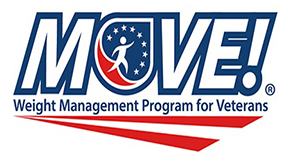Forty-one percent of Veterans receiving care from VA have obesity.

The Management of Adult Overweight and Obesity provides clear and comprehensive evidence-based recommendations.
There’s a brand new eight-page booklet right here that can help bring that number down.
The updated guidelines describe the critical decision points in the Management of Adult Overweight and Obesity. It provides clear and comprehensive evidence-based recommendations to inform weight management practices throughout the DoD and VA Health Care systems.
This is not about trying to fit into your old uniform. This is about your health. There are important health benefits that result from weight loss. These include improvements in blood pressure, cholesterol, the risk of developing diabetes and other chronic conditions, and even overall quality of life.
The new guidelines answer your questions.
- What is consider overweight?
- What is obesity? (Having a weight that is higher than what is considered healthy for a given height is described as overweight or obesity.)
- What should you ask your health care team?
- What is Body Mass Index? (There’s a great chart in the guidelines.)
- What should be my weight loss goal? (For many people with overweight or obesity, an initial goal is to lose just 5% of their body weight.)
- What is a Comprehensive Lifestyle Intervention? (Comprehensive lifestyle interventions are programs that combine changes to habits and behaviors as well as dietary intake, and physical activity, with support from a health coach or other member of a health care team.)
Comprehensive lifestyle interventions can help you achieve long-term weight management
Overweight and obesity are terms that describe different degrees of carrying extra fatty tissue – or body fat – above an ideal weight.
Weight loss is achieved when you take in less energy (fewer calories) than your body needs to maintain your current weight, especially if you also increase your level of regular physical activity. A comprehensive lifestyle intervention (such as VA’s MOVE! Weight Management Program) is an essential aspect of any effective overweight or obesity treatment program.
These programs help you to identify and make lasting changes in diet, physical activity and other behaviors, like regular weighing, to help you stay on track.
The guidelines also emphasize the value of specific medications, as well as surgical procedures for treating overweight and obesity, though these treatments should always be combined with a comprehensive lifestyle intervention.
Yes, you can.
Remember when you pushed back from the table and said, “Well, next year I’m going to get in shape?” Well, this is next year. If you need some inspiration, check out these success stories from Veterans who achieved significant weight loss after participating in the MOVE! program. Some are amazing and inspiring.
Get started here: VA’s MOVE! Weight Management Program.
Happy Healthy New Year! Here are those new Guidelines again.
Disclaimer: This Clinical Practice Guideline is intended for use only as a tool to assist a clinician/healthcare professional and should not be used to replace clinical judgment.
Topics in this story
More Stories
The 2024 National Veteran Suicide Prevention Annual Report provides the foundation for VA’s suicide prevention programs and initiatives.
Theranostics is a specialized field of nuclear medicine that uses a two-pronged approach to diagnose and treat cancer.
Air Force Veteran Shireta Jones overcomes obstacles with support from VA and adaptive devices to continue her passion for pickleball.








